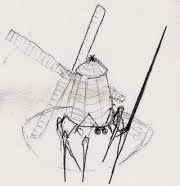If my life was summed up in a single sentence, that very well might be it.*
It hit home again today while I wrestled butternut logs across a stream and piled them atop a four foot bank. Because of where the storm-felled tree had grown, it was impossible to bring power equipment to bear; because I wanted to be able to mill the largest possible pieces from the trunk, it was cut in very large and heavy chunks; because I wanted it done now, I was doing it with a pulp-hook and good old-fashioned sweat.
I left the heaviest till last, and was only able to roll it. Way to heavy to lift unaided.
This was just grunt labor, and a small task. The really interesting things I want to do - build a undersea habitat or go to the Moon - are several orders of magnitude harder.
I remember the first time I realized how hard some things are.
When I was a kid, I had a large pile of sand rather than a sandbox. It was left over from when Dad built the house, and had become mixed with an assortment of Dinky cars and bricks, which sometimes led to interesting excavation projects using the Tonka front-end loader and a flattened** steel dump truck.
I remember sitting on this pile of sand with my mothers calculator, trying to work out the number of miles in a light year.
I was nine. I had been having some problems lately with some devices; the atomic reactor constructed of aluminum rods and bricks wouldn't exhibit fission, a space probe constructed of stovepipe had proved pretty inert, and several iterations of a anti-gravity driven spacecraft hadn't worked. Probably a good thing, because its not a good plan for kids to test the life-support capacity of a spaceship sealed with tar paper and scotch tape.***
Having pored over Terence Dickinson's
The Universe and Beyond, I had a pretty good idea that the Solar System was full of cold and unpleasant rocks, or hot and unpleasant rocks, or things like 'methane slush' which I couldn't picture, but suspected that it was also unpleasant. So I needed to reach another star, and Mr Dickinson told me that was the binary system α Centauri, at 4.3 light years away. I couldn't visualize a light year. Whats that in miles? I asked.
The calculator did not have enough zeros. While I was hazy what
1.0e+/- actually meant, I knew it wasn't a answer I could use, which meant time for some pencil and paper work. I still have the sheet of loose-leaf:
186,282 X 365 X 24 X 60 X 60 = 5,874,589,152,000
This was laboriously divided by 650 m.p.h. which for complex reasons was the fastest speed I imagined safely attainable, as I knew from various popular articles that breaking the speed of sound required complex engineering, and staying 30 m.p.h. under the 'Barrier' seemed like a safe margin.
The answer was depressing:
1,031,715 years per light year!
Thanks to
Analog magazine, I suspected that there were some sort of hibernation option, but it did seem like a depressing amount of time
, and it was unlikely my family would tolerate me being gone that long.
There is a certain point where childhood imagination is a mixture of science and magic; where wishing can fill in the gaps, and sheer dream-power can bridge the gulf between
what-there-is and
what-I-want. This is the gap that
Calvin and Hobbes dwells in, a space self-consciously inhabited by kayfabe and cosplay.
'Imagination is too often accompanied by somewhat irregular logic' -- Benjamin Disraeli
This isn't a new idea. Even Sorenson used it in the often-quoted speech he wrote for Kennedy to deliver:
"Its hazards are hostile to us all. Its conquest deserves the best of
all mankind, and its opportunity for peaceful cooperation may never come
again. (...)
We choose to go to the moon in this decade
and do the other things, not because they are easy, but because they
are hard, because that goal will serve to organize and measure the best
of our energies and skills, because that challenge is one that we are
willing to accept, one we are unwilling to postpone, and one which we
intend to win, and the others, too."
Close, but not quite. Despite what so many infected with the military-slash-sports mindset think, the point isn't the "win". Success becomes meaningless, because at that moment another task must be started, to continue the fun. This is part of what drained the enthusiasm from the space program post-landing. The hard part was done. Going there over and over was merely difficult. No further goal was announced.
The
doing is the "
thing and the whole of the thing."
I may not ever get greet you from the Moon****, but I am going to have fun on the way there.
*If you needed it done in a single word, that word would be 'Difficult'.
**Neighbor had driven a truck over it. No word of a lie. You could only empty the bed by lifting the truck's front end. Easy to do because the windshield was completely gone, and the gap was crushed into the right shape for a handhold.
***Navigation also required work. Keeping track of the position of Mars in the sky by mounting a red marble to the hand of clock was a neat idea, but
the clock didn't even work.
****Still torn between "Citizens of Earth!" or "Earthlings Ahoy!" as my opening salutation.

